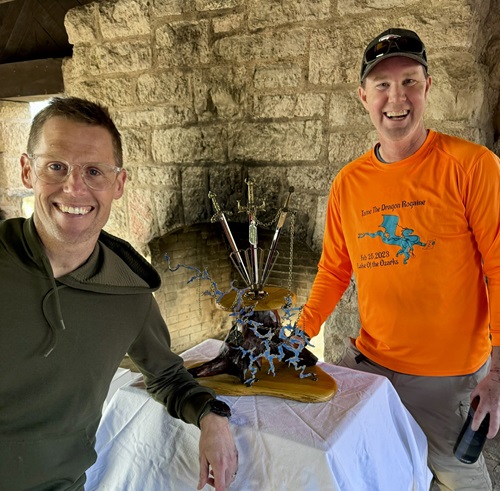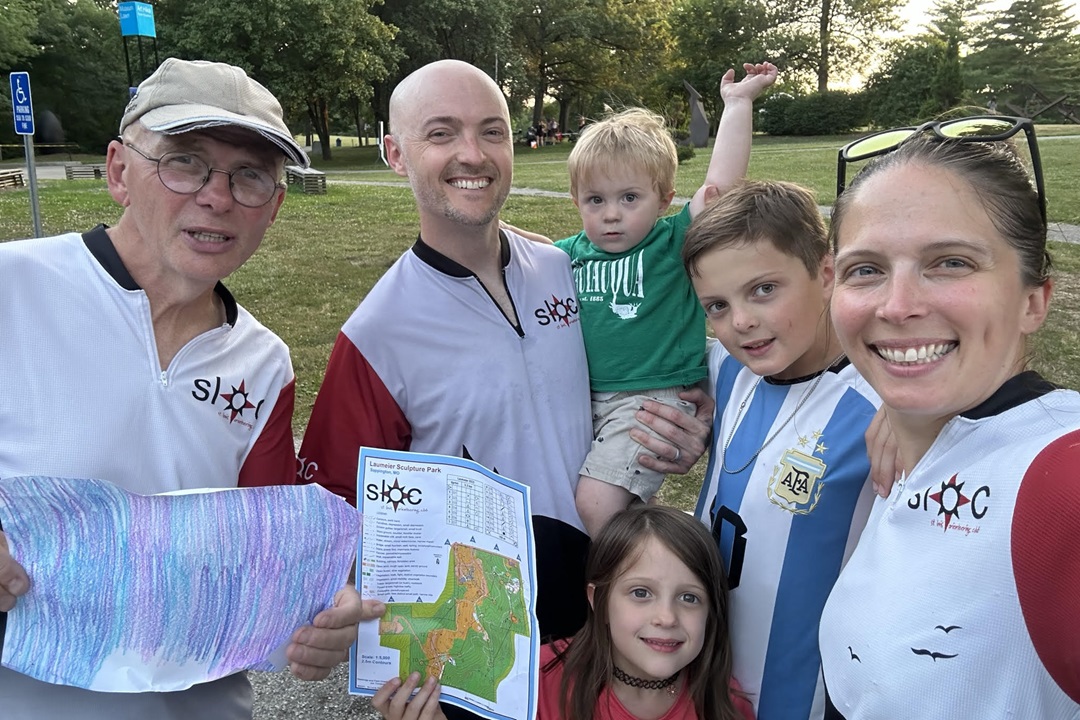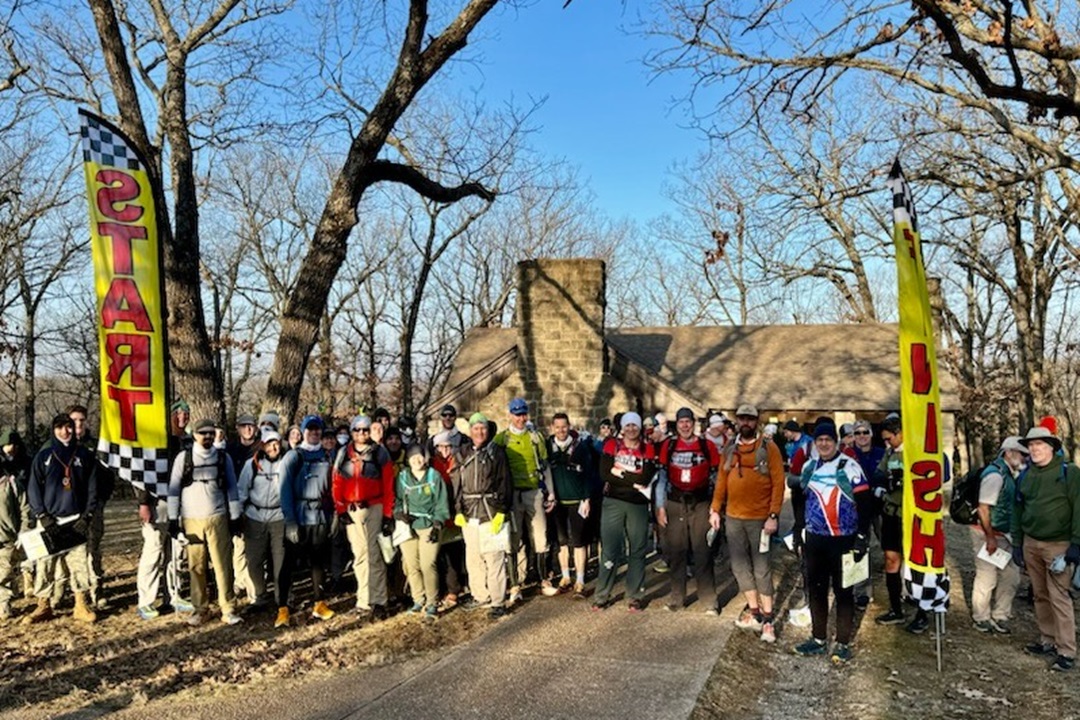For the first few years of Tame the Dragon, an annual orienteering competition at Lake of the Ozarks State Park, no one could finish the challenge. As many as 80 people gathered for eight intense hours of running and hiking through the hilly terrain with a compass and map, searching for the elusive checkmarks that would earn them points.
Year after year, competitors traveled from multiple Midwestern states for this adventure-style orienteering race, but completion evaded even the most ardent participants.
Finally, in 2023, St. Louis duo Jeff Ryan and Jason Noakes did it. They tamed the dragon by finding all 36 checkpoints and making it back to the starting location within eight hours. Then they did it again in 2024.
Winning an event like this takes a combination of athleticism and brainpower. Ryan said he and Noakes are well-matched in this regard.
“I’m six-foot-four and 200 pounds,” said Ryan. “Jason is 150 pounds, and he’s super-fast and athletic. I like navigating. He doesn’t want to look at the map.”
Wrong turns and backtracking, low blood sugar and clouded thinking — all these factors come into play in a competition like Tame the Dragon. Ryan said you must adjust your mindset, be aware of how you’re feeling mentally and physically, and check in on your partner as well.

In 2023, Jason Noakes (left) and Jeff Ryan finally captured the elusive Tame the Dragon trophy. (Courtesy of Jason Noakes)
While Tame the Dragon draws accomplished athletes like Ryan and Noakes, you’ll also see people taking it slower, walking rather than running as they navigate to various checkpoints. They’re not necessarily in it to win it. Instead, they enjoy the challenge of improving their navigation skills to hike from point to point. There’s a feeling of accomplishment no matter if you’re walking or running.
An eight-hour challenge is not typical for orienteering events, said Mark Geldmeier, president of St. Louis Orienteering Club. The group hosts about 15 events per year, and most take only an hour or two. A beginner option is always offered, he said, with experienced club members providing a brief overview for anyone new to the sport. Speaking of which…
What Is Orienteering, Anyway?
Orienteering is the sport of navigation — often held in unfamiliar terrain — using a map and compass.
The St. Louis Orienteering Club website describes it this way: “Whether walking or running, this sport involves endurance, ingenuity, and decision-making. It is a sport for everyone, regardless of age or experience with courses from beginner to advanced.”
It’s also a fun way to challenge your body and mind as you enjoy the outdoors.
The challenge of reading a map and solving a puzzle while getting a workout has been growing in popularity since it was introduced in the 1970s. It’s a much bigger sport in Europe, where orienteering competitions are as common as 5K runs here.
“Think fast, run hard. Go orienteering.” This slogan of the British Orienteering Federation sums up the mindset for many in Europe, although just like here, there are different levels and you don’t have to be a runner to participate.

An entire family can compete in the sport of orienteering. (St. Louis Orienteering Club)
Orienteering is a lot more involved than hiking and can be more fun than simply running because you’re using your brain to navigate and make decisions. It’s also beneficial for the brain, researchers say. Generations ago, we used our brains to hunt, gather, and find our way home. But reliance on GPS devices is causing us to lose navigational skills, which can lead to cognitive decline and even dementia, according to new research from McMaster University in Canada. Its report suggests that solving the puzzle of getting lost keeps the brain healthy.
Besides boosting brain health, orienteering is a great way to get kids and adults away from screens and out in nature. It also helps them build self-reliance skills for improved self-confidence.
Geldmeier said orienteering appeals to three categories of people:
- Adventure racers. These athletes want to get better at orienteering so they can improve their ability to traverse an adventure-race course, whether running, paddling, or mountain biking.
- Scouts and junior ROTC groups. Scouts can earn badges, while ROTC teens learn valuable skills that are required in the military.
- Outdoor-oriented families that want to do something outside other than hiking. They see it as a treasure hunt, a hike for a reason. And kids love punching the controls at each checkpoint.
Competitions come in two formats. The classic type is to navigate from point to point in a certain order, punching a checkpoint card or electronic device as you go. The second type is called Score-O, in which competitors can obtain the checkpoints in any order, but there’s a time limit. Points are added for extra-challenging checkpoints and deducted if you exceed the time limit.
There’s also a “sprint” event, which means the courses are shorter than usual. (You don’t literally have to sprint.)

Beautiful scenery is a side benefit of orienteering. (St. Louis Orienteering Club)
Getting Involved
It’s easy to get started in orienteering. In terms of gear, you need a compass and a good pair of trail-running or walking shoes. Long pants are helpful, as you may be off-trail at times, wading through long grass or brush. And you’ll probably want a water bottle and a small backpack.
The St. Louis Orienteering Club hosts events at local parks about once a month, with fees of around $5 for members and around $20 for non-members. Kids under 14 are free.
At each event, the club provides maps that show elevations, creeks, and other unique markers like large fallen trees or boulders. Club members are happy to answer questions.
If you decide to explore the sport of orienteering, Geldmeier said there’s a place for everyone, from novice to advanced. To find out more, including details on upcoming St. Louis Orienteering Club events, go to stlouisorienteering.org.
Author: Terri Waters is a frequent contributor to Terrain.
Top image: Participants gather at the starting line of Tame the Dragon. (St. Louis Orienteering Club)


Leave A Comment